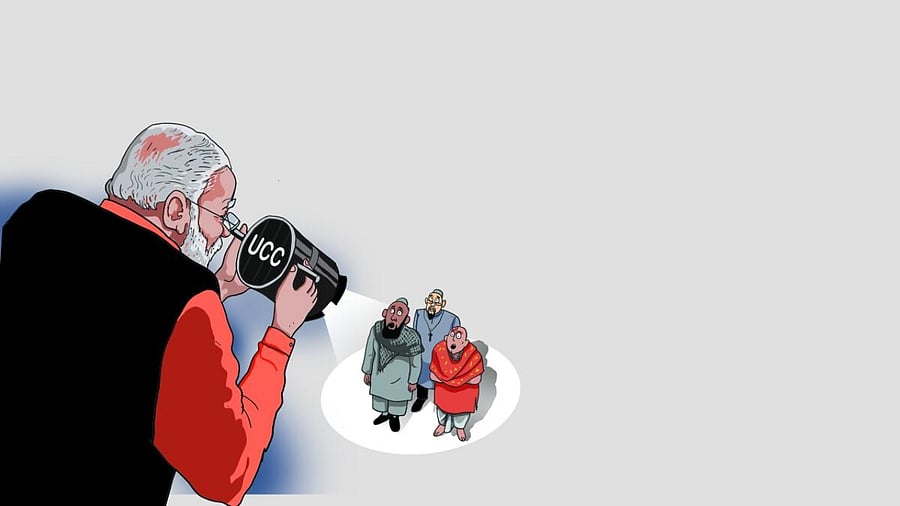

Not only the All India Muslim Personal Law Board but over 30 Adivasi organisations of Jharkhand have also opposed the latest push for the Uniform Civil Code after the 22nd Law Commission’s move for a fresh consultation on it. The Adivasi organisations argue that such a ‘uniform’ law would wipe out the tribal customs and practices constitutionally protected under the Fifth Schedule of the Constitution. The Adivasi communities living in the “Fifth Schedule areas” of central and eastern India are governed by the Chota Nagpur Tenancy Act, 1908 and the Santhal Parganas Tenancy Act, 1949 that give primacy to local customs when it comes to inheritance of land and property. Unlike the ‘Hindus’, the communities governed by these two laws are currently out of the ambit of the ‘Hindu Code’ – Hindu Succession Act, 1956, Hindu Marriage Act, 1955, Hindu Minority and Guardianship Act, 1956 and Hindu Adoptions and Maintenance Act, 1956 – unless the Union Government specifically make it applicable on any of them.
The concerns of the Adivasi communities are both material and spiritual. They worry that a UCC imposed on them will make it easier for non-Adivasis to take away their land. This is not a theoretical concern as learnt from the Pathalgadi protests that erupted in Jharkhand in 2016 after the then BJP-led government of the state moved to make it easier for non-adivasis to acquire adivasi land. The absence of any clarity on how a proposed UCC will address the issues relating to land only heightens the Adivasis' concerns.
The spiritual concern relates to a deeper question of faith - "Who is a ‘Hindu’?". Legally, the Hindu Code applies to everyone, who is not a Christian, Muslim or Parsi. It thus applies to Buddhists, Sikhs and Jains apart from those who practice Hinduism and everyone else the law considers 'Hindu'. But the Adivasi and the Scheduled Tribe communities fall in the grey zone. While the law presumes that they are ‘Hindu’, not all the Adivasis consider themselves as such. The Adivasis in Jharkhand, Chhattisgarh and Odisha, especially the Mundas, follow the Sarnaism and are seeking legal recognition of this through the census and promulgation of a ‘Sarna Code’ that will enshrine their customs into law. A UCC, while ostensibly being religion-neutral, will also diminish their claims of being distinct from the Hindus in customs and practices, denying legal recognition for their beliefs.
Tribal organisations and church bodies in Meghalaya and Nagaland have also stated that the UCC would be unacceptable. The state assembly of Mizoram earlier this year passed a resolution opposing the UCC. The concerns in the tribal majority northeastern states over the UCC stem from the fear that it would dilute the constitutional guarantee to their autonomy regarding laws regulating customs and practices. Article 371-A of the Constitution guarantees that no parliamentary law relating to customary laws, religious and social practices and transfer of land can apply to Nagaland without the approval of the state’s legislative assembly. A similar clause in Article 371-G guarantees Mizoram the same autonomy in respect of the same subjects.
The UCC thus cannot apply to Nagaland and Mizoram without the Constitution being amended or the Nagaland and Mizoram assemblies approving its application to the respective states. Given the popular opposition to the UCC in these states, it is unlikely that it will be approved by the respective legislatures.
The 21st Law Commission had noted exactly these objections while saying that a UCC was neither necessary nor desirable. It however did recommend the removal of certain unique features of the Hindu law of inheritance and succession that any UCC will necessarily incorporate. Specifically, it called for the abolition of coparcenary ownership of property and the abolition of the concept of a Hindu Undivided Family (HUF). Abolishing coparcenary property would mean that millions of Hindus would suddenly find themselves deprived of the shares in their ancestral properties that would now belong solely to the family patriarchs. Likewise, those who have planned their taxes around the concept of a HUF would find their businesses upturned because of the abolition of this concept. Unfortunately, the 21st Law Commission did not go into the potential chaos that these moves could bring while recommending them.
Nevertheless, the UCC will have to abolish these practices or, absurdly, impose them on communities that have never followed them in the first place. Either way, it will be a recipe for chaos as far as family-owned lands or businesses are concerned.
The 21st Law Commission actually undertook exhaustive, nationwide consultations before concluding that it was better to reform each set of family laws separately rather than replacing them with one law. While acknowledging concerns relating to gender justice, the 21st Law Commission argued that it was possible to maintain diversity and protect human rights in the context of family laws. It even provided a roadmap for doing so.
The Adivasis of the central and the eastern states and the tribal communities in the northeastern states have not changed their views on the UCC in the five years. So, one wonders what the 22nd Law Commission hopes to achieve by re-starting the debate. Likewise, the potential for economic chaos for Hindus to be triggered by the abolition of unique features of Hindu succession law should give pause to this exercise as well.
As the 21st Law Commission concluded: “...a ‘united’ nation need not necessarily have ‘uniformity’”.
(The writer is a co-founder of the Vidhi Centre for Legal Policy and an advocate.)